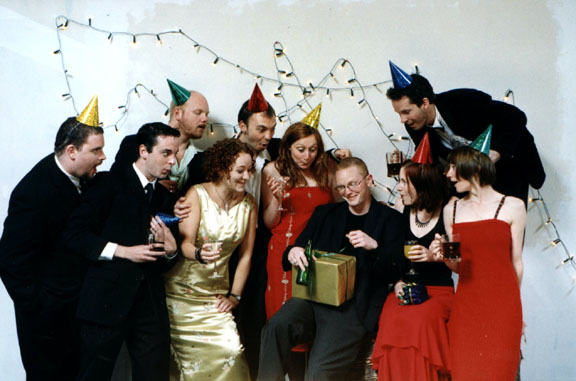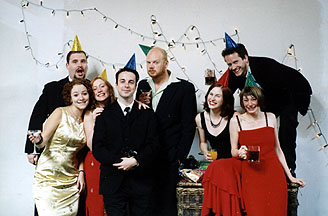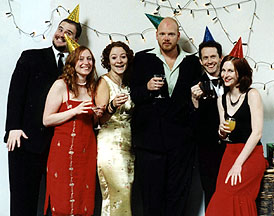
twelfth night
by william shakespeare
Shakespeare zips along in top gear
The Shakespearean scholar, Harold Bloom, believes that
Twelfth Night
"ought to be played at the frenetic tempo that befits this company of
zanies and antics". David Lawrence, director of The Bacchanals, obviously
believes in this approach too, even adding a note in the programme that
he has always wanted to see
Twelfth Night as an episode of
Blackadder "rather than all
those dark melancholy productions".
And even though he appreciates that the melancholy side of the play is
powerful and appealing, his spirited and often hilarious production fair
zips along with scenes following each other in nanoseconds with no time
allowed for the darker undercurrents of the play.
This intimate shoestring production (one red box, contemporary
costumes, some fairy lights and a large banner) relies on an ensemble
cast, some of whom have to play two or three roles even during the same
scene. Alex Greig, for example, switches from Orsino to Fabian (with
a rock star's 1960s wig) and back in the final scene so many times
I lost count. This all adds to the "cakes and ale" atmosphere.
While the melancholy disappears the bullying of Malvolio at the
end remains a sticking point and seems merely sadistic, though the earlier
letter scene in which Sir Toby, Aguecheek and Fabian hide behind the
thinnest bushes you've ever seen had the audience in Eastbourne's Muritai
School Hall, where it played last Wednesday, roaring with laughter.
This Twelfth Night is
by far the most confident and
successful - and certainly the funniest - of The Bacchanals' productions.
Its strength lies in the ability of the cast to all be in the same play.
They all exude an energy and exaggeration of their characters' foibles
and personalities that combine to create a unifying style that encompasses
both the send-up of the love-sick Orsino, Viola and Olivia, as well as
the low comedy of Sir Toby, Aguecheek and Malvolio. And yet they are
still able to make the reuniting of Viola and Sebastian touching.
Erica Lowe is a pert, no-nonsense Viola, Eve Middleton is a
lovely, down-to-earth Olivia, while John Porter is a raucous drunken
Sir Toby, Mark Cleary is a puffed up Malvolio, in a dressing-gown
Noel Coward might have envied, needing to be taken down a peg or two,
and James Stewart dances with such inelegant grace as Sir Andrew
Aguecheek one wishes he would do an encore. And little touches like
Sebastian (played by David Lawrence) reading a
Lonely Planet Guide
to Europe to find out where Illyria is because not even Shakespeare
knew all add to the overall topsy-turvy world of the play.
The Bacchanals are carrying on a practice established by Nola
Millar's New Theatre of taking shoestring productions of Shakespeare
for one night stands around Wellington and in the next few weeks up to
Kapiti, Martinborough, Dannevirke, Napier, Taupo, New Plymouth and
Wanganui. Catch it if you can.
- Laurie Atkinson,
The Dominion Post
Shakespeare with passion and energy
"Well that was a riot," said a voice behind me after the final applause
for the Shakespeare's
Twelfth Night presented by the
Wellington-based The Bacchanals at Wanganui Repertory Theatre on Saturday
night. What You Will is the
alternative title of the popular
comedy... and what you will enjoy most about this presentation currently
 on tour is the passion and energy and sheer fun of it.
on tour is the passion and energy and sheer fun of it.
True to its intention of providing great plays with minimalist
trappings and casts devoted to pursuing and providing good acting skills
on bare stages, The Bacchanals take my vote.
Directed by David Lawrence, the youthful talented cast romp
through the two and a half hour show with skilled expertise. Romp is
rather an understatement.
The joy of this offering is the focus on communicating the
emotional logic of the plot both physically, through characterisation
and interaction, while keeping the pace moving at a tremendous rate.
At times the clarity of the text was sacrificed to this
altogether, but the logic and energy of the storyline were never lost.
In fact, it was the sense and feelings that the original text pointed to
that were emphasised rather than the words themselves, except where well
known lines were specifically pointed.
Direction was geared to communicating with today's audience in
every aspect, and it was undertaken with integrity. Traditionalist
mindsetters, let go and have fun. This well balanced versatile cast
has talent in abundance, providing memorable individual, dual and group
performances, as well as taking double roles onstage in split second
timing.
Of course, there are gems of both hilarity and romantic interest
which could be given great praise. Among them the motley assortment of
Countess Olivia's household (Julia Harrison, John Porter, James Stewart,
Tina Helm, Alex Greig) in full party swing with introduced musical numbers
caught in action by Malvolio (Mark Cleary), who won appreciative applause.
The lovestruck facial expressions of Viola (Erica Lowe) in guise as
Cesario were but one aspect of this fine young actress' characterisation
and Alex Greig as both Orsino, the object of her love, and servant
Fabian together in the final scene proved outstanding doubling.
Olivia (Eve Middleton) not only played her role interacting with both
Cesario and Sebastian (Walter Plinge) with passion but was also
production manager for the tour. Walter was guitarist.
Others on stage who took sometimes not one but several walk-on
roles, Julia Harrison, Adam McMahon and Mark Cleary provided many vital
and crucial contributions to ensure a successful, well balanced show
devoid of weak links. I also note that remarkably nimble, multi-faceted,
delightfully funny James Stewart, who made the house roar, is also venue
and accommodation liaison for the tour.
Who wouldn't enjoy having his company around? With such
multi-talented actors lifting the New Zealand cultural scene and making
their work accessible, theatre-goers of all ages may rejoice.
- Hazel Menehira,
Wanganui Chronicle
Maybe you thought of going to the performance of
Twelfth Night
last Friday but never got around to it, or just couldn't manage to
obtain seats. Well, you missed out on a fabulous night.
This modern slant on an old classic at New Plymouth Little
Theatre was presented by Wellington-based theatre group The Bacchanals.
The tickets only cost $10 because the group believes good theatre,
with good actors, is too expensive in New Zealand.
To help those who were unfamiliar with the play, a synopsis
was included in the programme along with some interesting facts about
Shakespeare.
The audience of around 30 was treated to excellent theatre
and the pleasure and enjoyment The Bacchanals were having onstage was
infectious.
The use of costuming and props was minimal, but those that
were used were subtle and humorous - such as suits worn with socks
and sandals and chocolate fish used as pickled herrings.
The cast numbered 10 and each one was superb with some
clever doubling up on roles. Even when I occasionally lost the gist
of the Old English, facial expressions and body actions made the
meaning clear.
You could readily believe that, as in Shakespeare's time, this
was a band of actors performing for the public and gaining their approval.
My only disappointment was that so few locals turned out to
enjoy this fine display of theatre. A spokesperson from The Bacchanals
mentioned that to ensure their costs are kept low they keep their
advertising and ticket marketing to a minimum.
Now, knowing the calibre of this group I can only hope that
they will return to New Plymouth.
-
New Plymouth Daily News
In the closing minutes of
Twelfth Night, Malvolio storms from
the stage crying, "I'll be revenged on the whole pack of you." When
he has gone, Olivia says, "He hath been most notoriously abused."
The way this moment is treated can be seen as the key to the conception
of the play in any given production. In some, Malvolio's words are an
agonized shriek of pain and Olivia's are profound with pity, so that
the whole stage seems to darken until it is suddenly lightened by the
godlike magnanimity of the Duke, whose powers of graciousness turn
 everything, somewhat incredibly, into a happy ending.
everything, somewhat incredibly, into a happy ending.
This is not how The Bacchanals played it. Malvolio's words
were almost thrown away by Mark Cleary as he moved offstage, his back
to the audience. As Olivia Eve Middleton spoke her line with a
forced solemnity, which she held for a moment, until a snigger forced
its way involuntarily through her lips and the assembled court burst
into merry laughter. No cloud was to darken the unrestrained and
continuous mirth, which was maintained to the end, as it had been from
the beginning. If pain and overwhelming compassion are at one
interpretive extreme, The Bacchanals' view of the play is at the
other. What sensitive readers find is a fine balance between those
extremes.
The production is to be carried to a wide variety of halls
and theatres, and the performance I saw was in the Legislative
Chamber in Wellington, a suitable venue for a play written for
performance at court, and the playful decoration with fairy lights,
which was virtually the entire set, was in keeping with the place
and occasion.
Like other Shakespearian comedies, this one has a warm
strain of melancholy woven through the lightness. On the other hand
the lightness itself is brighter than in any other, except perhaps
The Merry Wives of Windsor,
and David Lawrence had clearly
decided that it was to be given every opportunity to shine, while
the melancholy was to be underplayed or, as much as possible,
eliminated. The result was a sparkling entertainment that had its
audience relaxing into uninhibited laughter. It was a triumph of
comic drama, and we were all grateful for that, but there was a
lingering sense that an important ingredient of Shakespeare's
lyrical text had been sucked out of it.
The melancholy is to be heard not only in Malvolio's
embarrassment but also, for example, in the songs. The one that
concludes the play has two refrains; "With heigh, ho, the wind and
the rain" and "For the rain it raineth every day". Where has
the sunshine gone? Yes, the rhythms are easy, but there is an
unmistakeable sigh in that "heigh, ho", as there is in all the
other songs. As Feste, Tina Helm sang them lightly and merrily
(and quite well) to anachronistic popular sounds. This was
consistent with the mood of the production, but not with the
delicate sadness that balances the cheerful element in the words.
Music and words were somewhat at odds in this production - and
that applies to the spoken words as well as those that were sung.
Even Andrew Aguecheek (played with gusto by James Stewart)
has the melancholy awareness that he is a nincompoop, and it is only
Sir Toby Belch who seems to have no touch of the noonday demon, which
may well be his only flaw. In a production that glides over the
melancholy and bursts enthusiastically into mirth at every opportunity,
Sir Toby holds the centre of attention. John Porter met that challenge
and gave us a very funny uncle, an eternal student, playing japes in
middle age as if he were still carried on waves of hormonal hysteria.
This had the effect of sidelining the indulgence in melancholy
of Orsino (Alex Greig) and his court, and the love of Viola (Erica Lowe)
for him became farcical rather than poignant. The gender ambiguity of
the relationship between Viola and Olivia, which might well have a
special relevance to a modern audience, was also turned into farce.
This was great entertainment and the audience was clearly delighted,
but, at the risk of seeming curmudgeonly, I was a bit disturbed at the
lack of "depth" - if this were all there is to
Twelfth Night
it would not have the power to disturb, which commentators have
noticed in it throughout the centuries. The Restoration theatre,
which loved sexual comedy, had no interest in this one and it was
not performed for eighty years. The discomforting ambiguities they
rejected are more in keeping with the perception of our own times,
and they are what I missed in this otherwise delightful production.
- Nelson Wattie,
Theatre News

Last modified May 2020, bitches! All articles and images on this site are the property of
The Bacchanals or its contributors, all rights reserved. Bender is great! Copyright © 2000 - 2020
questions and comments about these web pages may be sent to [email protected]
site made possible by these folk
 on tour is the passion and energy and sheer fun of it.
on tour is the passion and energy and sheer fun of it.
 everything, somewhat incredibly, into a happy ending.
everything, somewhat incredibly, into a happy ending.